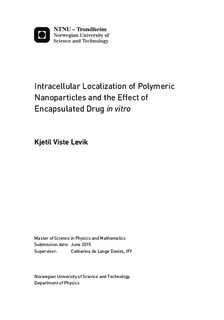Intracellular Localization of Polymeric Nanoparticles and the Effect of Encapsulated Drug in vitro
Master thesis
Permanent lenke
http://hdl.handle.net/11250/2353108Utgivelsesdato
2015Metadata
Vis full innførselSamlinger
- Institutt for fysikk [2695]
Sammendrag
Chemotherapy could be greatly improved if drug carriers could deliver the chemotherapeutic agents specifically to the cancer cells. SINTEF Materials and Chemistry have developed a novel, multimodal polymeric nanoparticle platform which is promising for drug delivery and other medical applications. In this thesis, nanoparticles made of biodegradable poly(butyl cyanoacrylate) were used to investigate intracellular localization of the nanoparticles. In addition, the effect of drug encapsulated in the nanoparticles was evaluated. PC3 cells and HeLa cells were used.Confocal laser scanning microscopy was used to study colocalization between the nanoparticles and lysosomes. Lysosomes were stained with CellLight Lysosomes-GFP, while the nanoparticles were loaded with the fluorescent dye NR668. Very few nanoparticles were taken up by PC3 cells, but most of them was found to colocalize with lysosomes. The results from these experiments strengthens the hypothesize of endocytotic uptake of the nanoparticles. AlamarBlue cell viability assay was used to study the impact of encapsulated drug on cell proliferation, while flow cytometry was used to assess the impact of encapsulated drug on the cell cycle distribution. Drug encapsulated in nanoparticles was found to work very similar to free drug. This indicates that the nanoparticles or the released drug are able to escape the lysosomes. In addition it proves that the encapsulation process does not alter this drug in such a way that it becomes ineffective.
